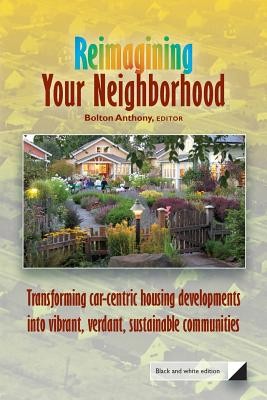
- We will send in 10–14 business days.
- Author: Bolton Anthony Ed D
- Publisher: CreateSpace Independent Publishing Platform
- Year: 2016
- Pages: 192
- ISBN-10: 1541264061
- ISBN-13: 9781541264069
- Format: 15.2 x 22.9 x 1 cm, minkšti viršeliai
- Language: English
- SAVE -10% with code: EXTRA
Reviews
Description
Most Americans live in suburbia, in car-centric housing developments which trace their lineage back to Levittown and the returning WWII GIs. These suburban neighborhoods are, for the most part, very good at guarding our privacy and dismal at fostering our sense of belonging and community. We can't just scrap the whole 80-year experiment in suburban living; we've got too much invested in infrastructure. But we CAN take many practical steps to reimagine our neighborhoods so that they nourish intergenerational connections and support aging in community. From simple steps - such as creating a ListServ, forming a neighborhood watch, or starting a CSA - to ambitious undertakings - such as creating a common house, an Eldercare Home, and a community energy system - the book's 22 contributors offer a creative, incremental approach that can reinvent the existing suburban landscape, one neighborhood at a time.
EXTRA 10 % discount with code: EXTRA
The promotion ends in 21d.21:20:53
The discount code is valid when purchasing from 10 €. Discounts do not stack.
- Author: Bolton Anthony Ed D
- Publisher: CreateSpace Independent Publishing Platform
- Year: 2016
- Pages: 192
- ISBN-10: 1541264061
- ISBN-13: 9781541264069
- Format: 15.2 x 22.9 x 1 cm, minkšti viršeliai
- Language: English English
Most Americans live in suburbia, in car-centric housing developments which trace their lineage back to Levittown and the returning WWII GIs. These suburban neighborhoods are, for the most part, very good at guarding our privacy and dismal at fostering our sense of belonging and community. We can't just scrap the whole 80-year experiment in suburban living; we've got too much invested in infrastructure. But we CAN take many practical steps to reimagine our neighborhoods so that they nourish intergenerational connections and support aging in community. From simple steps - such as creating a ListServ, forming a neighborhood watch, or starting a CSA - to ambitious undertakings - such as creating a common house, an Eldercare Home, and a community energy system - the book's 22 contributors offer a creative, incremental approach that can reinvent the existing suburban landscape, one neighborhood at a time.


Reviews